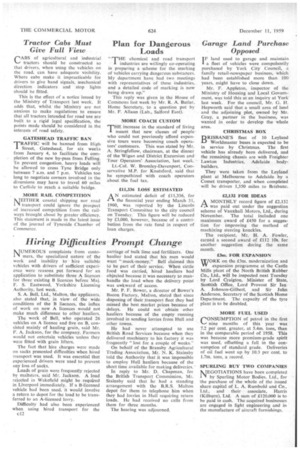Hiring Difficulties Prompt Change
Page 48

If you've noticed an error in this article please click here to report it so we can fix it.
MUMEROUS complaints from custo i mers, the specialized nature of the work and inability to hire suitable vehicles with drivers of sufficient experience were reasons put forward for an application to substitute three A licences for three existing B licences before Maj. F. S. Eastwood, Yorkshire Licensing Authority, last week.
S. A. Bell, Ltd., Malton, the applicants, also stated that, in view of the wide conditions of the B liecnces. the influx of work on new A licences would not make much difference to other hauliers.
The work of Bell, who operated 26 vehicles on A licence and five on B, consisted mainly of hauling grain, said Mr. F. A. Jackson, for the company. Farmers would not entertain vehicles •unless they were fitted with grain lifters.
The fact that hire charges were made on sacks presented difficulties when hired transport was used. It was essential that experienced drivers were used to prevent any loss of sacks.
Loads of grain were frequently rejected by maltsters. said Mr. Jackson. A load rejected in Wakefield might be required in Liverpool immediately. If a B-licensed vehicle had been used, it would involve a return to depot for the load to be transferred to an A-licensed lorry.
Difficulty had also been experienced when using hired transport for the c12 carriage of bulk lime and fertilizers. One haulier had stated that his men would want " muck-money." Bell Claimed this to be part of their service. When cattle food was carried, hired hauliers had objected because it was necessary to mailhandle the load when the delivery point was awkward of access.
Mr. P. F. Bower, a director of Bower's Bacon Factory, Malton, stated that since disposing of their transport fleet they had missed the best market prices because of delays. He could not obtain other hauliers because of the empty running involved in sending lorries from Hull and other towns.
He had never attempted to use British Road Services because when they delivered machinery to his factory it was frequently "lost for a couple of weeks."
On behalf of the Bransby Agricultural Trading Association, Mr. N. K. Stainsby told the Authority that it was impossible to employ Hull hauliers because of the short time available for making deliveries.
In reply to Mr. D. Chapman, for the British Transport Commission, Mr. Stainsby said that he had a standing arrangement with the B.R.S. Malton depot for them to telephone him when they had lorries in Hull requiring return loads. He had received no calls from them for three months.
The hearing was adjourned.
























































































































